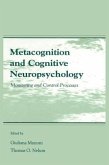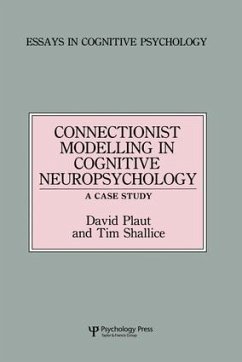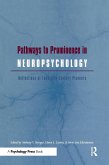Neuropsychology of Malingering Casebook
Herausgeber: Morgan, Joel E.; Sweet, Jerry J.
Neuropsychology of Malingering Casebook
Herausgeber: Morgan, Joel E.; Sweet, Jerry J.
- Broschiertes Buch
- Merkliste
- Auf die Merkliste
- Bewerten Bewerten
- Teilen
- Produkt teilen
- Produkterinnerung
- Produkterinnerung
Clinical neuropsychologists often have to evaluate individuals within a forensic context, and therefore must address questions regarding the possible presence of malingering. This volume offers a wide range of instructive real world case examples and presentations of malingering from expert forensic colleagues for the purpose of providing informed opinions on the topic. Chapter authors detail cases of not only malingering, but those cases presenting a complex picture that requires sophisticated differential diagnosis. Related topics, such as response bias and insufficient effort, are also…mehr
Andere Kunden interessierten sich auch für
![Neuropsychology of the Amnesic Syndrome (PLE Neuropsychology of the Amnesic Syndrome (PLE]() Alan J. ParkinNeuropsychology of the Amnesic Syndrome (PLE69,99 €
Alan J. ParkinNeuropsychology of the Amnesic Syndrome (PLE69,99 €![An Assessment Guide To Geriatric Neuropsychology An Assessment Guide To Geriatric Neuropsychology]() Holly TuokkoAn Assessment Guide To Geriatric Neuropsychology82,99 €
Holly TuokkoAn Assessment Guide To Geriatric Neuropsychology82,99 €![Metacognition and Cognitive Neuropsychology Metacognition and Cognitive Neuropsychology]() Metacognition and Cognitive Neuropsychology81,99 €
Metacognition and Cognitive Neuropsychology81,99 €![Connectionist Modelling in Cognitive Neuropsychology Connectionist Modelling in Cognitive Neuropsychology]() David C. PlautConnectionist Modelling in Cognitive Neuropsychology54,99 €
David C. PlautConnectionist Modelling in Cognitive Neuropsychology54,99 €![Pathways to Prominence in Neuropsychology Pathways to Prominence in Neuropsychology]() Pathways to Prominence in Neuropsychology56,99 €
Pathways to Prominence in Neuropsychology56,99 €![Neuropsychology of Art Neuropsychology of Art]() Dahlia W. ZaidelNeuropsychology of Art78,99 €
Dahlia W. ZaidelNeuropsychology of Art78,99 €![Introducing Neuropsychology Introducing Neuropsychology]() John StirlingIntroducing Neuropsychology102,99 €
John StirlingIntroducing Neuropsychology102,99 €-
-
-
Clinical neuropsychologists often have to evaluate individuals within a forensic context, and therefore must address questions regarding the possible presence of malingering. This volume offers a wide range of instructive real world case examples and presentations of malingering from expert forensic colleagues for the purpose of providing informed opinions on the topic. Chapter authors detail cases of not only malingering, but those cases presenting a complex picture that requires sophisticated differential diagnosis. Related topics, such as response bias and insufficient effort, are also thoroughly discussed with regard to a large number of clinical conditions and assessment instruments.
Hinweis: Dieser Artikel kann nur an eine deutsche Lieferadresse ausgeliefert werden.
Hinweis: Dieser Artikel kann nur an eine deutsche Lieferadresse ausgeliefert werden.
Produktdetails
- Produktdetails
- Verlag: Psychology Press
- Seitenzahl: 696
- Erscheinungstermin: 23. Juni 2015
- Englisch
- Abmessung: 254mm x 178mm x 37mm
- Gewicht: 1286g
- ISBN-13: 9781138882935
- ISBN-10: 1138882933
- Artikelnr.: 42517831
- Herstellerkennzeichnung Die Herstellerinformationen sind derzeit nicht verfügbar.
- Verlag: Psychology Press
- Seitenzahl: 696
- Erscheinungstermin: 23. Juni 2015
- Englisch
- Abmessung: 254mm x 178mm x 37mm
- Gewicht: 1286g
- ISBN-13: 9781138882935
- ISBN-10: 1138882933
- Artikelnr.: 42517831
- Herstellerkennzeichnung Die Herstellerinformationen sind derzeit nicht verfügbar.
Joel E. Morgan has been active in professional neuropsychology for over 20 years as teacher, clinician, and journal editor. He is board certified by the American Board of Clinical Neuropsychology of ABPP and currently serves as an oral examiner. Dr. Morgan is active in professional affairs having served on the BOD of the American Academy of Clinical Neuropsychology and Division 40 of APA where he is currently a representative to APA Council. He maintains an active forensic private practice in addition to his editorial, board, and other professional activities. Jerry J. Sweet is Director of the Neuropsychology Service, Head of the Psychology Division, and Vice Chair of the Psychiatry & Behavioral Sciences Department at Evanston Northwestern Healthcare, Evanston, IL. He holds the academic rank of Professor in the Department of Psychiatry and Behavioral Sciences of the Feinberg School of Medicine of Northwestern University, and is board certified in clinical neuropsychology and clinical psychology by the American Board of Professional Psychology. Dr. Sweet edited the textbook Forensic Neuropsychology: Fundamentals and Practice, co-authored the text Psychological Assessment in Medical Settings, and co-edited Handbook of Clinical Psychology in Medical Settings. He has served on numerous journal editorial boards and is currently Co-Editor of The Clinical Neuropsychologist (official journal of the American Academy of Clinical Neuropsychology). Dr. Sweet has published numerous peer-reviewed articles on psychological and neuropsychological assessment, including a large collection of studies relevant to forensic neuropsychology. He has been active in a number of professional societies and is Past President of the American Academy of Clinical Neuropsychology.
R.K. Heaton
Foreword. Part 1. Foundations of Malingering in Neuropsychology. J.J. Sweet
Neuropsychology and the Law: Malingering Assessment in Perspective. W.G. van Gorp
J. Hassenstab
Why Questions Regarding Effort and Malingering are Always Raised in Forensic Neuropsychological Evaluations. S.R. Millis
What Clinicians Really Need to Know about Symptom Exaggeration
Insufficient Effort
and Malingering: Statistical and Measurement Matters. Part 2. Civil Litigation. Traumatic Brain Injury in Adults. R.D. Vanderploeg
H.G. Belanger
Multifactorial Contributions to Questionable Effort and Test Performance within a Military Context. G.J. Larrabee
Mild Traumatic Brain Injury
Depression
or Malingered Neurocognitive Dysfunction: Change in Zeitgeist
Change in Diagnosis. M.F. Greiffenstein
Factitious or Fictitious Brain Injury? An Adventure in Applying the DSM-IV. W. Mittenberg
D. Roberts
Mild Traumatic Brain Injury in Civil Litigation. L.M. Binder
Malingering Brain Injury after Whiplash Trauma. W.J. Baker
Brain Trauma
Psychiatric Disturbance
Premorbid Factors
and Malingering. C. Paniak
Moderate to Severe Traumatic Brain Injury: Probable Malingering ... and then Not. Psychiatric and Medical Disorders. J.E. Morgan
R.O. Gervais
Definite Malingering or Probable Malingering: Multidimensional Symptom Exaggeration in a Case of Depression. P. Green
Questioning Common Assumptions about Depression. R. Rogers
S.D. Bender
Feigning Mental Disorders with Concomitant Cognitive Deficits. J.J. Sweet
Posttraumatic Stress Disorder and Neuropsychological Malingering: A Complicated Scenario. D.T.R. Berry
R.P. Granacher
Jr.
Feigning of Psychiatric Symptoms in the Context of Documented Severe Head Injury and Preserved Motivation on Neuropsychological Testing. B.N. Axelrod
Fabrication of Psychiatric Symptoms: Somatoform and Psychotic Disorders. N.W. Nelson
J.J. Sweet
Malingering of Psychiatric Disorders in Neuropsychological Evaluations: Divergence of Cognitive Effort Measures and Psychological Test Validity Indicators. L. Artiola i Fortuny
Factitious Disorder in Civil Litigation. J.E. Morgan
S.R. Millis
J. Mesnik
Malingered Dementia and Feigned Psychosis. Difficult to Diagnose or Questionable Conditions. J. DeLuca
Chronic Fatigue Syndrome and Malingering. J. Youngjohn
Lyme Disease: Consideration of Malingered Disability. R.O. Gervais
Fibromyalgia: Resignation
Restitution
and Response Bias. P.R. Lees-Haley
Mold and the Joy of Malingering. L. Artiola i Fortuny
Alleged Mold Toxicity. K.J. Bianchini
K.W. Greve
Chronic Pain as a Context for Malingering. D.S. Bush
Alleged Carbon Monoxide Poisoning. R.L. Mapou
HIV Disease
AIDS
and HIV-Associated Dementia in a Secondary Gain Context. N. Pliskin
Electrical Injury and Malingered Cognitive Dysfunction. Pediatric and Learning/Academic Disorders. L. Flaro
K.B. Boone
Using Objective Effort Measures to Detect Noncredible Test Performance in Children and Adolescents. R.J. McCaffery
J.K. Lynch
Malingering Following Documented Brain Injury: Neuropsychological Evaluation of Children in a Forensic Setting. D.C. Osmon
Q. R. Mano
Malingered Attention Deficit Hyperactivity Disorder: Effort
Depression
and Dependence in the Pursuit of Academic Accommodations. Part 3. Criminal Prosecution. J.E. Morgan
Competency to Stand Trial and the Insanity Defense. R.L. Denney
Evaluating Competency to Stand Trial and Sanity in the Face of Marked Amnesia and Claimed Psychosis. R. Frederick
The Malingering Incompetent Defendant. R.L. Heilbronner
Malingering
Mental Retardation
and the Death Penalty. Part 4. The Perspective of Legal Experts and Disability Decision Makers. J. Green
Disability Insurance Case Management: External Consultant. J.E. Sargent
M. Fuller
Disability Insurance Case Management: Insurance Company. M.D. DeBofsky
Social Security Adjudication: Attorney Representing Disability Claimants. H.G. Conroe
Social Security Adjudication: Regional Consultant. J. Krakora
Criminal Court: Defense Attorney. Part 5. Ethics and Professional Issues. J.D. Seward
D.J. Connor
Ethical Issues in Assigning (or Withholding) a Diagnosis of Malingering. S.S. Bush
What to do after Making a Determination of Malingering. Part 6. Current Status and Future Directions . M. Bergman
J.J. Sweet
Complexities of the Differential Diagnosis of Malingering: Arguments for the Use of Effort Tests with Patients. J.J. Sweet
J.E. Morgan
What We Currently Know About Malingering "to a Reasonable Degree of Neuropsychological Certainty" vs. What We Would Like to Know in the Future. Appendices. J.J. Sweet
Appendix A: Measures Specifically Intended to Detect Insufficient Effort and Motivation: A Cross-Referenced Bibliography. Appendix B: Neuropsychological and Psychological Measures Used to Identify Insufficient Effort and Malingering: A Cross-Referenced Bibliography. Appendix C: Additional Articles Pertinent to Malingering. Appendix D: Topics Common to Forensic Neuropsychology Consultation. Appendix E: General References. D.J. Slick
E.M.S. Sherman
G.I. Iverson
Appendix F: Diagnostic Criteria for Malingered Neurocognitive Dysfunction: Proposed Standards for Clinical Practice and Research (reprinted from The Clinical Neuropsychologist).
Foreword. Part 1. Foundations of Malingering in Neuropsychology. J.J. Sweet
Neuropsychology and the Law: Malingering Assessment in Perspective. W.G. van Gorp
J. Hassenstab
Why Questions Regarding Effort and Malingering are Always Raised in Forensic Neuropsychological Evaluations. S.R. Millis
What Clinicians Really Need to Know about Symptom Exaggeration
Insufficient Effort
and Malingering: Statistical and Measurement Matters. Part 2. Civil Litigation. Traumatic Brain Injury in Adults. R.D. Vanderploeg
H.G. Belanger
Multifactorial Contributions to Questionable Effort and Test Performance within a Military Context. G.J. Larrabee
Mild Traumatic Brain Injury
Depression
or Malingered Neurocognitive Dysfunction: Change in Zeitgeist
Change in Diagnosis. M.F. Greiffenstein
Factitious or Fictitious Brain Injury? An Adventure in Applying the DSM-IV. W. Mittenberg
D. Roberts
Mild Traumatic Brain Injury in Civil Litigation. L.M. Binder
Malingering Brain Injury after Whiplash Trauma. W.J. Baker
Brain Trauma
Psychiatric Disturbance
Premorbid Factors
and Malingering. C. Paniak
Moderate to Severe Traumatic Brain Injury: Probable Malingering ... and then Not. Psychiatric and Medical Disorders. J.E. Morgan
R.O. Gervais
Definite Malingering or Probable Malingering: Multidimensional Symptom Exaggeration in a Case of Depression. P. Green
Questioning Common Assumptions about Depression. R. Rogers
S.D. Bender
Feigning Mental Disorders with Concomitant Cognitive Deficits. J.J. Sweet
Posttraumatic Stress Disorder and Neuropsychological Malingering: A Complicated Scenario. D.T.R. Berry
R.P. Granacher
Jr.
Feigning of Psychiatric Symptoms in the Context of Documented Severe Head Injury and Preserved Motivation on Neuropsychological Testing. B.N. Axelrod
Fabrication of Psychiatric Symptoms: Somatoform and Psychotic Disorders. N.W. Nelson
J.J. Sweet
Malingering of Psychiatric Disorders in Neuropsychological Evaluations: Divergence of Cognitive Effort Measures and Psychological Test Validity Indicators. L. Artiola i Fortuny
Factitious Disorder in Civil Litigation. J.E. Morgan
S.R. Millis
J. Mesnik
Malingered Dementia and Feigned Psychosis. Difficult to Diagnose or Questionable Conditions. J. DeLuca
Chronic Fatigue Syndrome and Malingering. J. Youngjohn
Lyme Disease: Consideration of Malingered Disability. R.O. Gervais
Fibromyalgia: Resignation
Restitution
and Response Bias. P.R. Lees-Haley
Mold and the Joy of Malingering. L. Artiola i Fortuny
Alleged Mold Toxicity. K.J. Bianchini
K.W. Greve
Chronic Pain as a Context for Malingering. D.S. Bush
Alleged Carbon Monoxide Poisoning. R.L. Mapou
HIV Disease
AIDS
and HIV-Associated Dementia in a Secondary Gain Context. N. Pliskin
Electrical Injury and Malingered Cognitive Dysfunction. Pediatric and Learning/Academic Disorders. L. Flaro
K.B. Boone
Using Objective Effort Measures to Detect Noncredible Test Performance in Children and Adolescents. R.J. McCaffery
J.K. Lynch
Malingering Following Documented Brain Injury: Neuropsychological Evaluation of Children in a Forensic Setting. D.C. Osmon
Q. R. Mano
Malingered Attention Deficit Hyperactivity Disorder: Effort
Depression
and Dependence in the Pursuit of Academic Accommodations. Part 3. Criminal Prosecution. J.E. Morgan
Competency to Stand Trial and the Insanity Defense. R.L. Denney
Evaluating Competency to Stand Trial and Sanity in the Face of Marked Amnesia and Claimed Psychosis. R. Frederick
The Malingering Incompetent Defendant. R.L. Heilbronner
Malingering
Mental Retardation
and the Death Penalty. Part 4. The Perspective of Legal Experts and Disability Decision Makers. J. Green
Disability Insurance Case Management: External Consultant. J.E. Sargent
M. Fuller
Disability Insurance Case Management: Insurance Company. M.D. DeBofsky
Social Security Adjudication: Attorney Representing Disability Claimants. H.G. Conroe
Social Security Adjudication: Regional Consultant. J. Krakora
Criminal Court: Defense Attorney. Part 5. Ethics and Professional Issues. J.D. Seward
D.J. Connor
Ethical Issues in Assigning (or Withholding) a Diagnosis of Malingering. S.S. Bush
What to do after Making a Determination of Malingering. Part 6. Current Status and Future Directions . M. Bergman
J.J. Sweet
Complexities of the Differential Diagnosis of Malingering: Arguments for the Use of Effort Tests with Patients. J.J. Sweet
J.E. Morgan
What We Currently Know About Malingering "to a Reasonable Degree of Neuropsychological Certainty" vs. What We Would Like to Know in the Future. Appendices. J.J. Sweet
Appendix A: Measures Specifically Intended to Detect Insufficient Effort and Motivation: A Cross-Referenced Bibliography. Appendix B: Neuropsychological and Psychological Measures Used to Identify Insufficient Effort and Malingering: A Cross-Referenced Bibliography. Appendix C: Additional Articles Pertinent to Malingering. Appendix D: Topics Common to Forensic Neuropsychology Consultation. Appendix E: General References. D.J. Slick
E.M.S. Sherman
G.I. Iverson
Appendix F: Diagnostic Criteria for Malingered Neurocognitive Dysfunction: Proposed Standards for Clinical Practice and Research (reprinted from The Clinical Neuropsychologist).
R.K. Heaton
Foreword. Part 1. Foundations of Malingering in Neuropsychology. J.J. Sweet
Neuropsychology and the Law: Malingering Assessment in Perspective. W.G. van Gorp
J. Hassenstab
Why Questions Regarding Effort and Malingering are Always Raised in Forensic Neuropsychological Evaluations. S.R. Millis
What Clinicians Really Need to Know about Symptom Exaggeration
Insufficient Effort
and Malingering: Statistical and Measurement Matters. Part 2. Civil Litigation. Traumatic Brain Injury in Adults. R.D. Vanderploeg
H.G. Belanger
Multifactorial Contributions to Questionable Effort and Test Performance within a Military Context. G.J. Larrabee
Mild Traumatic Brain Injury
Depression
or Malingered Neurocognitive Dysfunction: Change in Zeitgeist
Change in Diagnosis. M.F. Greiffenstein
Factitious or Fictitious Brain Injury? An Adventure in Applying the DSM-IV. W. Mittenberg
D. Roberts
Mild Traumatic Brain Injury in Civil Litigation. L.M. Binder
Malingering Brain Injury after Whiplash Trauma. W.J. Baker
Brain Trauma
Psychiatric Disturbance
Premorbid Factors
and Malingering. C. Paniak
Moderate to Severe Traumatic Brain Injury: Probable Malingering ... and then Not. Psychiatric and Medical Disorders. J.E. Morgan
R.O. Gervais
Definite Malingering or Probable Malingering: Multidimensional Symptom Exaggeration in a Case of Depression. P. Green
Questioning Common Assumptions about Depression. R. Rogers
S.D. Bender
Feigning Mental Disorders with Concomitant Cognitive Deficits. J.J. Sweet
Posttraumatic Stress Disorder and Neuropsychological Malingering: A Complicated Scenario. D.T.R. Berry
R.P. Granacher
Jr.
Feigning of Psychiatric Symptoms in the Context of Documented Severe Head Injury and Preserved Motivation on Neuropsychological Testing. B.N. Axelrod
Fabrication of Psychiatric Symptoms: Somatoform and Psychotic Disorders. N.W. Nelson
J.J. Sweet
Malingering of Psychiatric Disorders in Neuropsychological Evaluations: Divergence of Cognitive Effort Measures and Psychological Test Validity Indicators. L. Artiola i Fortuny
Factitious Disorder in Civil Litigation. J.E. Morgan
S.R. Millis
J. Mesnik
Malingered Dementia and Feigned Psychosis. Difficult to Diagnose or Questionable Conditions. J. DeLuca
Chronic Fatigue Syndrome and Malingering. J. Youngjohn
Lyme Disease: Consideration of Malingered Disability. R.O. Gervais
Fibromyalgia: Resignation
Restitution
and Response Bias. P.R. Lees-Haley
Mold and the Joy of Malingering. L. Artiola i Fortuny
Alleged Mold Toxicity. K.J. Bianchini
K.W. Greve
Chronic Pain as a Context for Malingering. D.S. Bush
Alleged Carbon Monoxide Poisoning. R.L. Mapou
HIV Disease
AIDS
and HIV-Associated Dementia in a Secondary Gain Context. N. Pliskin
Electrical Injury and Malingered Cognitive Dysfunction. Pediatric and Learning/Academic Disorders. L. Flaro
K.B. Boone
Using Objective Effort Measures to Detect Noncredible Test Performance in Children and Adolescents. R.J. McCaffery
J.K. Lynch
Malingering Following Documented Brain Injury: Neuropsychological Evaluation of Children in a Forensic Setting. D.C. Osmon
Q. R. Mano
Malingered Attention Deficit Hyperactivity Disorder: Effort
Depression
and Dependence in the Pursuit of Academic Accommodations. Part 3. Criminal Prosecution. J.E. Morgan
Competency to Stand Trial and the Insanity Defense. R.L. Denney
Evaluating Competency to Stand Trial and Sanity in the Face of Marked Amnesia and Claimed Psychosis. R. Frederick
The Malingering Incompetent Defendant. R.L. Heilbronner
Malingering
Mental Retardation
and the Death Penalty. Part 4. The Perspective of Legal Experts and Disability Decision Makers. J. Green
Disability Insurance Case Management: External Consultant. J.E. Sargent
M. Fuller
Disability Insurance Case Management: Insurance Company. M.D. DeBofsky
Social Security Adjudication: Attorney Representing Disability Claimants. H.G. Conroe
Social Security Adjudication: Regional Consultant. J. Krakora
Criminal Court: Defense Attorney. Part 5. Ethics and Professional Issues. J.D. Seward
D.J. Connor
Ethical Issues in Assigning (or Withholding) a Diagnosis of Malingering. S.S. Bush
What to do after Making a Determination of Malingering. Part 6. Current Status and Future Directions . M. Bergman
J.J. Sweet
Complexities of the Differential Diagnosis of Malingering: Arguments for the Use of Effort Tests with Patients. J.J. Sweet
J.E. Morgan
What We Currently Know About Malingering "to a Reasonable Degree of Neuropsychological Certainty" vs. What We Would Like to Know in the Future. Appendices. J.J. Sweet
Appendix A: Measures Specifically Intended to Detect Insufficient Effort and Motivation: A Cross-Referenced Bibliography. Appendix B: Neuropsychological and Psychological Measures Used to Identify Insufficient Effort and Malingering: A Cross-Referenced Bibliography. Appendix C: Additional Articles Pertinent to Malingering. Appendix D: Topics Common to Forensic Neuropsychology Consultation. Appendix E: General References. D.J. Slick
E.M.S. Sherman
G.I. Iverson
Appendix F: Diagnostic Criteria for Malingered Neurocognitive Dysfunction: Proposed Standards for Clinical Practice and Research (reprinted from The Clinical Neuropsychologist).
Foreword. Part 1. Foundations of Malingering in Neuropsychology. J.J. Sweet
Neuropsychology and the Law: Malingering Assessment in Perspective. W.G. van Gorp
J. Hassenstab
Why Questions Regarding Effort and Malingering are Always Raised in Forensic Neuropsychological Evaluations. S.R. Millis
What Clinicians Really Need to Know about Symptom Exaggeration
Insufficient Effort
and Malingering: Statistical and Measurement Matters. Part 2. Civil Litigation. Traumatic Brain Injury in Adults. R.D. Vanderploeg
H.G. Belanger
Multifactorial Contributions to Questionable Effort and Test Performance within a Military Context. G.J. Larrabee
Mild Traumatic Brain Injury
Depression
or Malingered Neurocognitive Dysfunction: Change in Zeitgeist
Change in Diagnosis. M.F. Greiffenstein
Factitious or Fictitious Brain Injury? An Adventure in Applying the DSM-IV. W. Mittenberg
D. Roberts
Mild Traumatic Brain Injury in Civil Litigation. L.M. Binder
Malingering Brain Injury after Whiplash Trauma. W.J. Baker
Brain Trauma
Psychiatric Disturbance
Premorbid Factors
and Malingering. C. Paniak
Moderate to Severe Traumatic Brain Injury: Probable Malingering ... and then Not. Psychiatric and Medical Disorders. J.E. Morgan
R.O. Gervais
Definite Malingering or Probable Malingering: Multidimensional Symptom Exaggeration in a Case of Depression. P. Green
Questioning Common Assumptions about Depression. R. Rogers
S.D. Bender
Feigning Mental Disorders with Concomitant Cognitive Deficits. J.J. Sweet
Posttraumatic Stress Disorder and Neuropsychological Malingering: A Complicated Scenario. D.T.R. Berry
R.P. Granacher
Jr.
Feigning of Psychiatric Symptoms in the Context of Documented Severe Head Injury and Preserved Motivation on Neuropsychological Testing. B.N. Axelrod
Fabrication of Psychiatric Symptoms: Somatoform and Psychotic Disorders. N.W. Nelson
J.J. Sweet
Malingering of Psychiatric Disorders in Neuropsychological Evaluations: Divergence of Cognitive Effort Measures and Psychological Test Validity Indicators. L. Artiola i Fortuny
Factitious Disorder in Civil Litigation. J.E. Morgan
S.R. Millis
J. Mesnik
Malingered Dementia and Feigned Psychosis. Difficult to Diagnose or Questionable Conditions. J. DeLuca
Chronic Fatigue Syndrome and Malingering. J. Youngjohn
Lyme Disease: Consideration of Malingered Disability. R.O. Gervais
Fibromyalgia: Resignation
Restitution
and Response Bias. P.R. Lees-Haley
Mold and the Joy of Malingering. L. Artiola i Fortuny
Alleged Mold Toxicity. K.J. Bianchini
K.W. Greve
Chronic Pain as a Context for Malingering. D.S. Bush
Alleged Carbon Monoxide Poisoning. R.L. Mapou
HIV Disease
AIDS
and HIV-Associated Dementia in a Secondary Gain Context. N. Pliskin
Electrical Injury and Malingered Cognitive Dysfunction. Pediatric and Learning/Academic Disorders. L. Flaro
K.B. Boone
Using Objective Effort Measures to Detect Noncredible Test Performance in Children and Adolescents. R.J. McCaffery
J.K. Lynch
Malingering Following Documented Brain Injury: Neuropsychological Evaluation of Children in a Forensic Setting. D.C. Osmon
Q. R. Mano
Malingered Attention Deficit Hyperactivity Disorder: Effort
Depression
and Dependence in the Pursuit of Academic Accommodations. Part 3. Criminal Prosecution. J.E. Morgan
Competency to Stand Trial and the Insanity Defense. R.L. Denney
Evaluating Competency to Stand Trial and Sanity in the Face of Marked Amnesia and Claimed Psychosis. R. Frederick
The Malingering Incompetent Defendant. R.L. Heilbronner
Malingering
Mental Retardation
and the Death Penalty. Part 4. The Perspective of Legal Experts and Disability Decision Makers. J. Green
Disability Insurance Case Management: External Consultant. J.E. Sargent
M. Fuller
Disability Insurance Case Management: Insurance Company. M.D. DeBofsky
Social Security Adjudication: Attorney Representing Disability Claimants. H.G. Conroe
Social Security Adjudication: Regional Consultant. J. Krakora
Criminal Court: Defense Attorney. Part 5. Ethics and Professional Issues. J.D. Seward
D.J. Connor
Ethical Issues in Assigning (or Withholding) a Diagnosis of Malingering. S.S. Bush
What to do after Making a Determination of Malingering. Part 6. Current Status and Future Directions . M. Bergman
J.J. Sweet
Complexities of the Differential Diagnosis of Malingering: Arguments for the Use of Effort Tests with Patients. J.J. Sweet
J.E. Morgan
What We Currently Know About Malingering "to a Reasonable Degree of Neuropsychological Certainty" vs. What We Would Like to Know in the Future. Appendices. J.J. Sweet
Appendix A: Measures Specifically Intended to Detect Insufficient Effort and Motivation: A Cross-Referenced Bibliography. Appendix B: Neuropsychological and Psychological Measures Used to Identify Insufficient Effort and Malingering: A Cross-Referenced Bibliography. Appendix C: Additional Articles Pertinent to Malingering. Appendix D: Topics Common to Forensic Neuropsychology Consultation. Appendix E: General References. D.J. Slick
E.M.S. Sherman
G.I. Iverson
Appendix F: Diagnostic Criteria for Malingered Neurocognitive Dysfunction: Proposed Standards for Clinical Practice and Research (reprinted from The Clinical Neuropsychologist).








